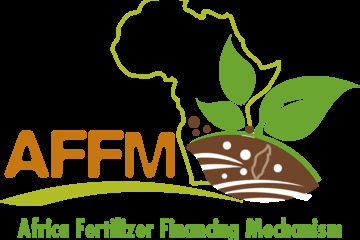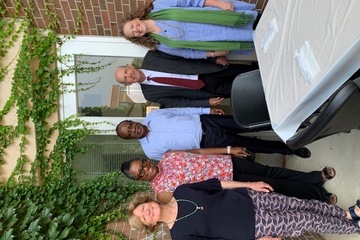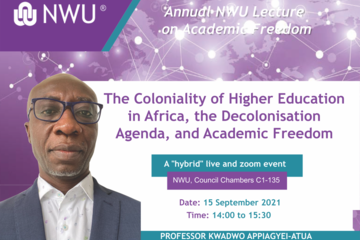Browse
Digital Communications Workshop at LUANAR
AAP is proud to highlight the new digital strategy work recently accomplished with our affiliates at @LUANAR led by AAP’s communications coordinator @Wisdom Nelson Chimgwede. LUANAR has currently moved to improve dissemination of best practices including research findings through digital means.
Speaking at a web, social media and on-line content management training the University’s Vice Chancellor Professor Emmanuel Kaunda said the development is aimed at enhancing the university’s relevance among farmers and stakeholders in the provision of the much needed information and knowledge on agricultural transformation.
Through its affiliation with AAP, LUANAR identified some gaps revealing the need to strengthen the communications functions and AAP has offered to provide technical assistance through the communications section at the university.
Attached is a video feature from the workshop.
By:
Raquel Acosta
Thursday, Sep 16, 2021
OTHER
Leave a comment
Mali’s roadmap for lasting peace has laudable goals: but it doesn’t go far enough
Steve Esquith, one of the PIs during the first round of AAP Transformation Institutions Strategic Partnership Grants and an African Futures mentor, has recently published an article within @TheConversation. This article is related to his peace-building work achieved under the grant. We encourage colleagues to read through his review of Mali’s new government action plan.
Read the article: https://theconversation.com/malis-roadmap-for-lasting-peace-has-laudable-goals-but-it-doesnt-go-far-enough-166419
By:
Raquel Acosta
Tuesday, Sep 14, 2021
CULTURE AND SOCIETY

Leave a comment
East and Southern Africa Fertilizer Financing Forum
The Africa Fertilizer Financing Mechanism (AFFM), in collaboration with the African Fertilizer and Agribusiness Partnership (AFAP) and AFRIQOM, will be hosting the first virtual edition of the East and Southern Africa Fertilizer Financing Forum on Thursday, 28 October 2021.
The event has been themed “Strengthening Regional Collaboration to Finance Fertilizer in the Agribusiness Value Chain”, and will facilitate the identification of opportunities for building and fostering partnerships with sectorial stakeholders in order to enhance access to finance and agricultural productivity in East and Southern Africa.
The East and Southern Africa Fertilizer Financing Forum will bring together regional member countries, regional and international development and commercial financial institutions, farmers, private sector, and non-governmental organizations.
The goal will be for participants to deliberate on potential solutions to existing bottlenecks to fertilizer financing. Delegates will also discuss ways to scale up funding in the region by leveraging the African Continental Free Trade Area (AfCFTA) initiative and other existing success stories.
Click here to register for the event
By:
Derek Tobias
Thursday, Sep 9, 2021
AGRI-FOOD SYSTEMS

Leave a comment
Connecting with Prof Ayiro and Daystar University
Professor and Vice Chancellor Laban Ayiro from Daystar University, Provost Teresa Woodruff,
ISP Dean Steve Hanson, AAP leadership, and faculty in the College of Communications Arts and Sciences had the opportunity to meet Aug 24. Prof Ayiro met with leadership from the College of Communications and the KEY Team to discuss potential collaborative relationships. AAP is grateful for connecting with Prof Ayiro and Daystar University.
Attached are photos from the event and lunch with Prof. Ayiro capturing Provost Teresa Woodruff, Professor Laban Ayiro, ISP Dean Steve Hanson, AAP Director Jose Jackson-Malete, AAP Director, Amy Jamison, Prof. David Ewoldsen, and Prof. Nancy Rhodes.
By:
Raquel Acosta
Thursday, Sep 9, 2021
EDUCATION

Leave a comment
LECTURE: Coloniality of Higher Education in Africa, the Decolonisation Agenda, and Academic Freedom
You are cordially invited to the Annual NWU Lecture on Academic Freedomby Prof. Kwadwo Appiagyei-Atua, School of Law, University of Ghana,Legon, Accra.Topic: The Coloniality of Higher Education in Africa, theDecolonisation Agenda, and Academic FreedomDate and time: 15 September 2021, 14:00 to 15:30 SAST
If you wish to attend by zoom, please RSVP here:https://urldefense.com/v3/__https://us02web.zoom.us/webinar/register/WN_45iNwZg9THawSADRufGyPA__;!!HXCxUKc!kPN0uvfLvGQ2OI8pyHfemNnhy1vtZVtyWJf3S_H1PlMaNUwFKaopZgNXOtevBAY$ (the event link will be provided to you)
By:
Annemi Conradie
Thursday, Sep 9, 2021
EDUCATION

Leave a comment
Building Sustainable Research Management Capacity in Sub-Saharan Africa: AAP Co-director Published
Co-director of AAP MSU Office, Jose Jackson-Malete, has recently had a chapter published! “Building Science Systems in Africa” is a culmination of a project focused on building capacity of African science councils to collaborate with each other and the private sector. The project was led by the African Centre for Technology Studies, the Science, Technology, and Innovation Policy Research Organization (STIPRO), the Scinnovent Centre, and the Association of African Universities. Jose Jackson, alongside co-authors Karin Dyason, Dipalesa Mpye, and Zimasa Sobuza, wrote the chapter “Building Sustainable Research Management Capacity in Sub-Saharan Africa” which discusses the increasing professionalization of research management.
The e-book is made available open access on the ACTS website and also the SGCI website.
https://www.acts-net.org/publications/books/building-science-systems-in-africa
By:
Madeleine Futter
Friday, Aug 27, 2021
OTHER
No Preview Available
Leave a comment
[RUFORUM Press Release] Seventh African Higher Education Week and RUFORUM Triennial Conference
Kampala 17 August 2021: The Regional Universities Forum for Capacity Building in Agriculture (RUFORUM) is pleased to announce the Seventh African Higher Education Week and RUFORUM Triennial Conference that will be hosted by the Government of the Republic of Benin in partnership with the University of Abomey Calavi, University of Parakou and the National University of Agriculture, from the 06th – 10th December, 2021 at Palais des Congres de Cotonou, Benin.
The Seventh African Higher Education Week and RUFORUM Triennial Conference will run under the theme “Operationalising Higher Education for Innovation, Industrialisation, Inclusion and Sustainable Economic Development in Africa: A Call for Action”
The conference will bring together participants from across Africa and the world to discuss how African universities are working toward improving their mandates of training, research and outreach, to produce innovations and entrepreneurial youth that meet the demands in the global competitive market. The participants will be drawn from Universities, Civil Society Organizations-CSOs, National and International Research Organizations, Development Partners, Governments, Continental and Regional Organizations, African Union Commission, Food and Agriculture Organization (FAO), Non-Governmental Organizations, the Private sector, farmers & farmer representatives, emerging & early career researchers, and young entrepreneurs from especially Benin and other West African countries. Universities, private sector actors and young entrepreneurs will have the opportunity to showcase their innovations, products and services. Due to the restrictions and risks associated with the COVID-19, African Higher Education Week and RUFORUM Triennial Conference is being organized using a blended approach, which will include both face-to-face and virtual meetings.
RUFORUM will recognise farmers that have made significant contribution to agricultural transformation in Benin as a way of supporting national advancement and transformation of agriculture. RUFORUM shall also recognise scientists and other actors that have made significant contribution and supported the advancement of excellence in research and higher education for the development of Africa. Young Innovators and Entrepreneurs from Benin will be recognised to promote the contribution of the youth to the economic development of Africa and to provide youth with the forum to demonstrate their innovations.
The Conference will be preceded by several virtual side events including: Scientific Data Management training for Post-Graduate Students Using R Programming Language, Evaluating the Impact of Entrepreneurship in Agribusiness Training, Social media training for students, Interdisciplinary Training for Early Career Scientists & doctoral students, and a business & entrepreneurship training for Young Innovators and entrepreneurs.
This year, because of the COVID-19 restrictions and risks associated with travel during this period, it will not be possible for all delegates to travel to Benin to participate. Therefore, some delegates will be requested to participate virtually through an online platform. We have therefore designed the attendance Questionnaire for RUFORUM Triennial Conference 2021 to enable the organizers know your preference in terms of traveling to Benin or attending the event face to face or virtually. We will also be happy to get essential information about you to enable effective planning.
This questionnaire is expected to take not more than 7 minutes of your time.
Learn more: https://ruforum.wordpress.com/2021/08/19/press-release-seventh-african-higher-education-week-and-ruforum-triennial-conference/?utm_source=RUFORUM+Mailing+List&utm_campaign=d18db56afe-RUFORUM+Weekly+-+Vol.3+No.25_COPY_01&utm_medium=email&utm_term=0_1fcfbb8a0b-d18db56afe-346973753&ct=t()&goal=0_1fcfbb8a0b-d18db56afe-346973753&mc_cid=d18db56afe&mc_eid=d95cf18a8d
By:
Madeleine Futter
Thursday, Aug 26, 2021
AGRI-FOOD SYSTEMS
+2

No Preview Available
Leave a comment
Empowering Youth in Agriculture with Youth-focused Initiatives Webinar
African Fertilizer and Agribusiness Partnership (AFAP) is hosting a webinar 26 Aug 08:00-10:00 EST (14:00-16:00 CAT). This webinar's objectives include:
Provide a platform for knowledge and experience exchange on the importance of Agricultural Technological Innovation for food security and as a catalyst to boost productivity and economic growth on the African continent.
Focuses on entrepreneurship, innovation, and education. It is designed specifically for AGRISME Entrepreneurs and aspiring entrepreneurs.
Awareness creation on the opportunities and how to maximize the opportunities.
Promote an Entrepreneurial mindset as a job generation tool
Showcase AGRISME success stories - Success breeds success
Promote partnerships and leverage strengths among actors in the Agriculture sector
The webinar consists of a two-hour live streamed meeting, open to the public, with an expert panel and the opportunity for Q&A.
To Register: http://events.r20.constantcontact.com/register/event?oeidk=a07eifrlae2a9592f0f&llr=m5euwduab
By:
Madeleine Futter
Friday, Aug 20, 2021
YOUTH EMPOWERMENT
No Preview Available
Leave a comment
The Emerging African Scholars' Virtual PhD Workshop 2021: Combined Professional Development Workshop
ARCOSA has published a recording of their Emerging African Scholar's Virrtual PhD Wrokshop for anyone to view! This video specifically captures the "Navigating the Publication Process: Advice for Junior Scholars from Journal Editors" session.
The session was anchored by Professor Zachariah Mampilly; Marxe Endowed Chair of International Affairs at the Marxe School of Public and International Affairs at City University New York.
By:
Madeleine Futter
Friday, Aug 20, 2021
YOUTH EMPOWERMENT
+2
Leave a comment
To Tax or not To Tax? Questioning Customer Loyalty Programmes
South Africa, like many other countries, needs additional sources of tax revenues. Recent debate indicates that one potential source of revenue is the taxation of customer loyalty rewards in the hands of customers. The arguments for the taxation of these rewards have been put forward from a principled perspective and not from a legal basis. We argue that while the taxation of these rewards would increase tax revenue, legislative reform is required as there are strong arguments that the rewards are actually not taxable. We suggest tax reforms that attempt to provide certainty and equity in the treatment of such rewards as a whole in order to provide additional revenue for the fiscus.
By:
Teresa Pidduck
Thursday, Aug 19, 2021
OTHER
Leave a comment
The Sasol Oil case – Would the present South African GAAR stand up to the rigours of the court?
South Africa finds itself vulnerable to exploitation by the measures taken by multinational enterprises (MNEs) who seek to enter into tax avoidance schemes that artificially shift profits to low- or no-tax jurisdictions. While common law, specific and general anti-avoidance measures may be used as a defence against these schemes, there has been no judicial consideration of the current South African general anti avoidance rule (GAAR) since its replacement in 2006. In this context this paper makes two contributions. First, the paper applies the current GAAR to a recent case where the predecessor to the current GAAR was applied to a scheme entered into by an MNE. This is done in order to determine if the current GAAR (unlike its predecessor) is able to stand up to the rigours of court when presented with similar facts. In doing so it demonstrates how the untested GAAR may be interpreted and applied. Second, the paper makes suggestions for amendment to the current GAAR in order to improve its efficacy in an international context.
By:
Teresa Pidduck
Thursday, Aug 19, 2021
OTHER
Leave a comment
Tax research methodology for untested legislation: An exemplar for the tax scholar
Tax scholars using typical doctrinal and reform-oriented methodologies often struggle to articulate the process undertaken in their research and at the same time, these methods often require an analysis of legislation that has already been the subject of judicial inquiry. However, this raises the challenge of what method to employ in the absence of such judicial inquiry. The tax environment has become so dynamic that law reform occurs rapidly and the law has to be researched, in the absence of case law post legislative amendment. This article provides tax scholars with a methodological approach described as a structured pre-emptive analysis that overcomes this problem (in other words an adaptation of typical doctrinal reform-oriented approaches). Using an exemplar of an actual tax law problem, the paper demonstrates how to conduct rigorous research in the absence of case law dealing with legislation that is the subject of enquiry. The article makes two contributions. First, it gives transparency to the traditional doctrinal reform-oriented methods primarily used in law. Second, it illustrates a method that can be used to overcome the absence of case law.
By:
Teresa Pidduck
Thursday, Aug 19, 2021
OTHER

Leave a comment